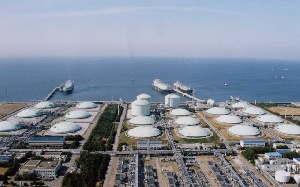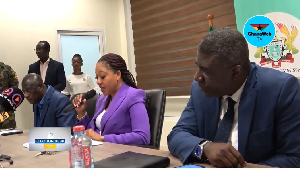Government has penned a deal to acquire a floating barge that will supply liquefied natural gas (LNG) to thermal plants for increased electricity generation in the country.
This was revealed by President John Dramani Mahama on Sunrise FM Thursday April 14, 2016, as part of his ‘Accounting to the People Tour’ of the country.
Mr Mahama, currently in the Eastern Region on the second leg of his nationwide visit, disclosed that though power supply is now matching demand, there was the need for the country to build up on reserves, which it could fall back on during emergencies.
“Currently, we are able to supply enough electricity across the country to whoever wants it, but we must continue to build on our redundancy. And we are working on the things that will make our power supply sustainable. So, for example, in the eastern part, in Tema, we normally have about 600MW of thermal generation that is stranded because we don’t get enough gas from the West Africa Gas Pipeline,” explained Mr Mahama.
“And, so, even though we have the power plants there, we are not able to run them because we don’t have gas; those plants run only on gas. And, so, if the gas doesn’t come, you cannot use the light crude oil, that is like KTP – the Kpone Thermal Plant. Asogli runs on only gas. We just finished Asogli Phase 2 – the first part which is 180MW. I am going to commission it sometime next month. It runs on only gas, and, so, anytime gas does not come through the West Africa Gas Pipeline, then it means that almost 500-600MW of power is not available to us.”
The president said as a response, his administration had signed an agreement to bring in the floating barge to ensure there is always gas available to feed the country’s thermal plants.
“…What we are doing is we have signed an agreement to bring to us what we call Floating Storage Reclassification Unit – an FSRU. It is a floating barge where you can bring LNG, the gas is liquefied. You bring it liquefied, you pass it through the regasification unit, [and] it turns it back to gas and feeds it into the thermal unit.
“It’s just as good as piping gas through the pipeline. And, so, we have signed the agreement and our hope is that by the end of the year we should have this floating storage regasification unit in place. And then, what will happen is, if we don’t get gas from the West African Gas Pipeline, then we can use liquid natural gas to ensure that our thermal plants in the Tema area are running.
“But when ENI comes, ENI is going to bring additional gas, almost 150 million cubic feet a day. Atuabo gas plant is doing about 100 million cubic feet a day, and, so, ENI is going to be 150 million cubic feet. So, it means that that is 250 million cubic feet a day. It means we can run more thermal plants.
“And then when Greater Jubilee comes on stream, that is another 150 million cubic feet of gas. Then we have the TEN field, for which the FPSO has arrived, the FPSO John Evans Atta Mills. That is going to give us 80 million standard cubic feet of gas.
“So, the prospects for electricity production are very bright and we’re taking all the steps to ensure Ghana becomes a major power hub of West Africa by the year 2020. By the year 2020, Ghana will be supplying not only itself with electricity, more than we need, but we will be the major supplier of electric power to our neighbouring countries.”
Click to view details



Business News of Friday, 15 April 2016
Source: classfmonline.com
Gov’t inks deal for LNG storage barge
Entertainment
















